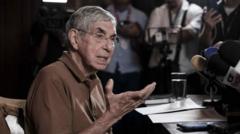Arias, who played a pivotal role in ending regional conflicts in Central America, revealed that he received only a brief email notification from the US government about the visa revocation. Although he refrained from making definitive claims, he alluded to his prior decision to sever diplomatic ties with Taiwan in favor of establishing relations with China in 2007 as a possible factor. The Trump administration's efforts to limit Chinese influence in Central America have been well-documented, and recent actions have included close support for Costa Rican President Rodrigo Chaves’ decisions regarding Chinese firms, further complicating the relationship. Arias criticized this alignment, highlighting the difficulties faced by smaller nations in expressing dissent against US policy.
His case is not an isolated incident, as other political figures in Costa Rica opposing President Chaves' approach have also experienced similar visa issues, hinting at a broader pattern within the realm of US-Central America relations.
As this situation unfolds, it raises essential questions regarding the intersection of political dissent, international diplomacy, and the rights of leaders to voice their opinions without repercussions.
His case is not an isolated incident, as other political figures in Costa Rica opposing President Chaves' approach have also experienced similar visa issues, hinting at a broader pattern within the realm of US-Central America relations.
As this situation unfolds, it raises essential questions regarding the intersection of political dissent, international diplomacy, and the rights of leaders to voice their opinions without repercussions.


















